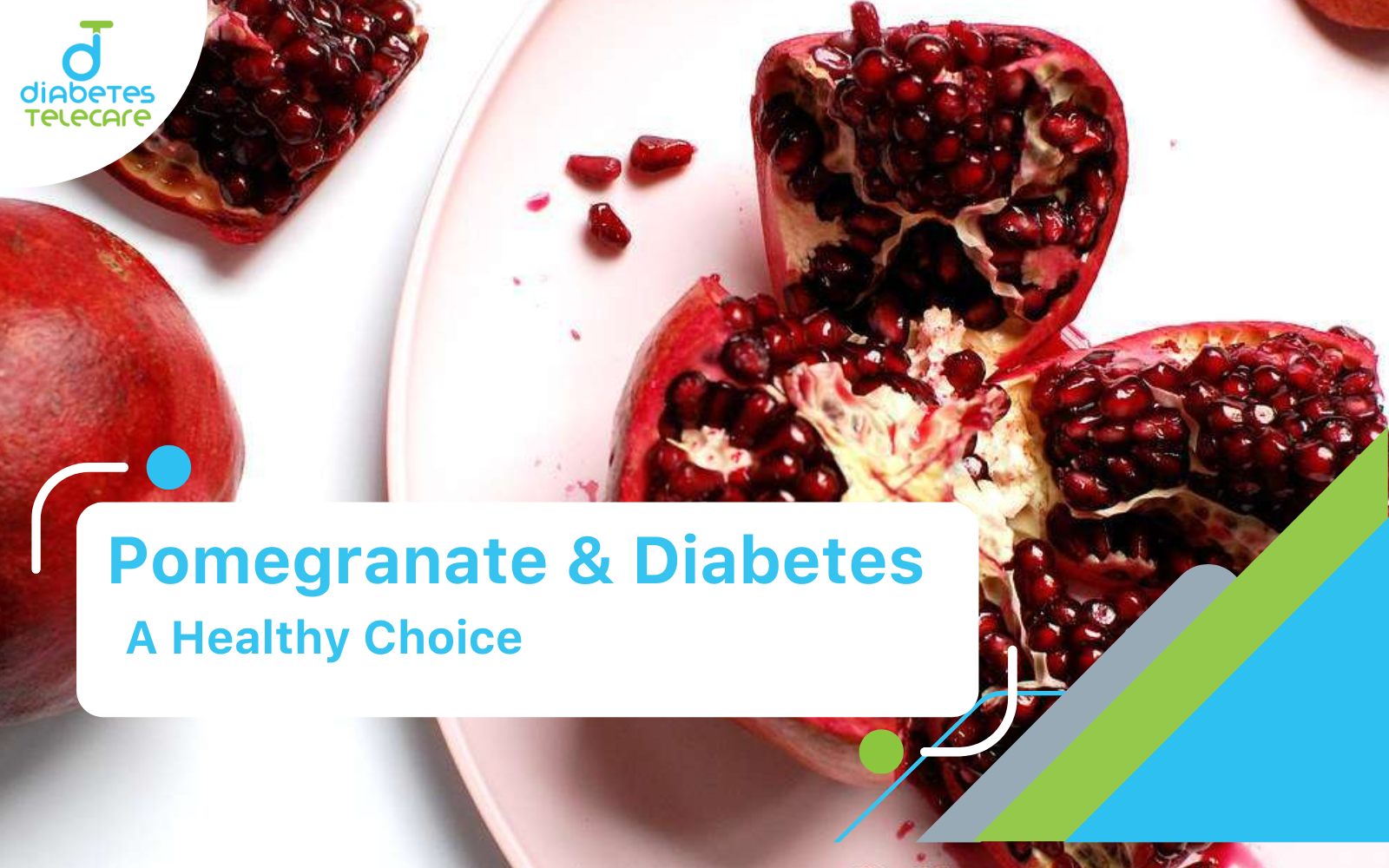
-
Posted By Diabetes TeleCare
-
-
Comments 0
Pomegranates are sour, sweet fruits with crimson, thick skin. Though inedible, the skin contains hundreds of delicious seeds that may be eaten raw or used in salads, oats, hummus, and other recipes.
Pomegranates have long been prized for their health properties by humans. According to recent studies, pomegranate antioxidants may help shield your heart. Further study is necessary to confirm the potential utility of pomegranates’ anti-inflammatory and anticancer effects in the treatment and prevention of cancer.
We’re going to get into the details of how pomegranate for diabetes can be especially helpful. We’ll discuss this fruit’s nutritional qualities and health benefits and offer helpful tips for diabetics on how to include it in their diet.
Nutritional Profile of Pomegranate
Pomegranates are a rich source of vital nutrients and bioactive substances. The following explains why this fruit is so unique:
Vitamins and Minerals: Potassium, folate, and vitamins C and K are abundant in pomegranates. These nutrients are essential for preserving both general health and physiological processes.
Antioxidants and phytochemicals: Punicalagins and anthocyanins, in particular, are abundant in this fruit and are known to help fight inflammation and oxidative stress.
Fiber Content: Pomegranates are high in dietary fiber, which is helpful for your digestive system and helps control blood sugar.
Pomegranate Benefits
Pomegranate for diabetes is good for your health in many ways. Their strong antioxidant content is the reason for many of the advantages. Pomegranates, for example, are up to three times higher in antioxidants than red wine or green tea. Foods high in antioxidants can lower inflammation and shield your cells from other harmful substances.
Rich in antioxidants
Antioxidants are substances that aid in shielding your body’s cells from harm brought on by free radicals. Excessive levels of free radicals can be detrimental and are linked to several chronic illnesses.
Punicalagin, anthocyanins, and hydrolyzable tannins are only a few of the polyphenolic chemicals and antioxidants found in pomegranates.
Consuming fruits like pomegranates, which are high in antioxidants, is a fantastic way to promote general health and ward against illness.
Better heart health
An example of an antioxidant is a polyphenol. Polyphenols are abundant in pomegranates. There is some evidence that polyphenols can help prevent heart and blood vessel disorders, including:
- The accumulation of lipids and cholesterol in your arteries, or atherosclerosis, is a major cause of heart disease.
- High blood pressure that, if unchecked, can result in a stroke
Low Glycemic Index
For diabetics, foods with a low glycemic index are best. Given that they meet this need, pomegranates for diabetes are a safe option for people who are watching their blood sugar levels.
It helps in the Management of Weight
Keeping oneself at a healthy weight is essential for diabetes management. Because they are high in fiber and low in calories, pomegranates can help people feel content and full, which lessens the urge to snack on harmful foods.
Strengthens Sensitivity to Insulin
Increased insulin sensitivity makes it possible for the body to use insulin more efficiently, which helps control blood sugar levels. It has been demonstrated that pomegranates improve insulin sensitivity.
Nutritional Facts (Per Serving)
Here’s what you can expect in a typical serving of pomegranate (about 174 grams):
- Calories: 83
- Carbohydrates: 19 grams
- Sugars: 14 grams
- Fiber: 4 grams
- Vitamin C: 18% of the Daily Value (DV)
- Vitamin K: 36% of the DV
- Folate: 16% of the DV
- Potassium: 12% of the DV
Is pomegranate good for people with diabetes?
In moderation, pomegranates are indeed beneficial to your health! In reality, pomegranates are said to have therapeutic properties and can be used to treat diabetes by people in the Middle East, where they are native. A more recent analysis has disputed the notion that the antioxidant chemicals in pomegranates for diabetes help decrease fasting blood sugar levels in people with type 2 diabetes, despite several earlier studies supporting this idea.
Recommended Quantity for Diabetic Patients
Safe Daily Intake
Pomegranate seeds are typically regarded as safe and healthy for diabetes when consumed in a half-cup portion each day. This quantity gives you the nutrition you need without giving you a big sugar rush.
Tips for Portion Control
To balance the sugar level of pomegranates, eat them following the suggested serving sizes and with other low-glycemic meals. For instance, combine almonds and pomegranate seeds with a high-protein yogurt.
Monitoring Blood Sugar Levels
Diabetics should check their blood sugar levels before making any dietary changes to see how pomegranates affect their body. It might be helpful to monitor any changes and modify portions by maintaining a food journal.
Conclusion
Pomegranates for diabetes are an excellent food choice due to their low glycemic index and high antioxidant content. This vibrant and nutritious fruit can be a valuable addition to a diabetic diet, helping to improve heart health, regulate blood sugar levels, and enhance overall well-being. The antioxidants in pomegranates also provide protection against inflammation and oxidative stress, which are common concerns for individuals with diabetes.
Including pomegranates in your meals can contribute to a balanced and health-conscious approach to managing diabetes. As always, the key is moderation and mindful eating to ensure the best outcomes for your health. Keep in mind that balance is vital; while fruits are healthy, they should be consumed in moderation to avoid blood sugar spikes.
For personalized care and deeper insights into managing diabetes, consider booking an appointment with our specialist. Your health deserves the best attention.
For Contact: +92 323 3004420
Recent News
- Are Carrots Good for Diabetes? Benefits and Glycemic Impact
- Bananas and Diabetes – Can Diabetics Eat Bananas? Find out here
- Managing Diabetes with Broccoli: Health Benefits and Tips
- How a Low Carb Diet Helps Diabetics Control Blood Sugar
- Is Sweet Potato Good for Diabetes? How They Affect Blood Sugar



